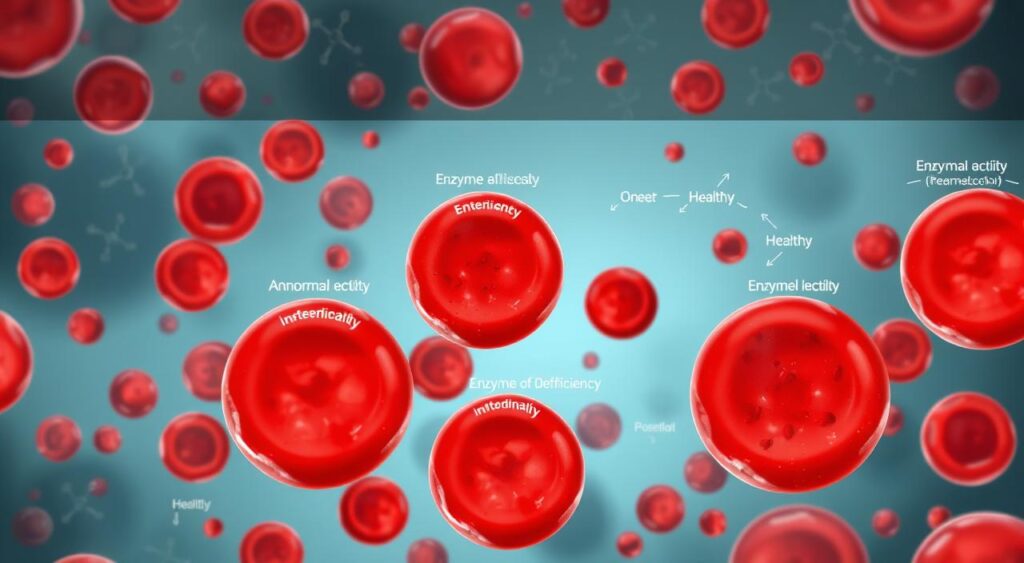About 1 in 5,000 people have red blood cell enzyme deficiencies. This is a big health issue. These disorders affect the enzymes in red blood cells, causing health problems. Knowing about rbc enzyme deficiencies is key to managing and treating them.
These deficiencies can really affect someone’s life. That’s why it’s important to learn about them.

RBC enzyme deficiencies can come from genes, other health issues, or the environment. Finding out why someone has it is the first step to treating it. By learning about the causes, symptoms, and treatments, people can handle their condition better. Managing rbc enzyme deficiencies needs a full plan, including doctor visits, changes in lifestyle, and support.
Key Takeaways
- 1 in 5,000 people are affected by rbc enzyme deficiencies
- RBC enzyme deficiencies can have a significant impact on an individual’s quality of life
- Understanding the causes of red blood cell enzyme deficiencies is crucial for effective management
- Genetic factors, acquired conditions, and environmental triggers can cause rbc enzyme deficiencies
- A comprehensive approach to management is necessary for effective treatment of red blood cell enzyme deficiencies
- Medical interventions, lifestyle modifications, and supportive care are essential for managing rbc enzyme deficiencies
Understanding RBC Enzyme Deficiencies
RBC enzyme deficiencies are disorders that affect red blood cells. They can cause health issues like anemia. It’s important to know what red blood cell enzymes are and their role in our bodies.
Red blood cells have enzymes that help them work right. These enzymes make energy, keep the cell shape, and protect against damage. Enzyme disorders, like rbc enzyme disorders, can harm these processes, causing cell damage and early destruction.
What are Red Blood Cell Enzymes?
Red blood cell enzymes are proteins that start chemical reactions in the cell. They are key for red blood cells to function well. They help make ATP, keep the cell shape, and protect against damage.
Role of Enzymes in RBC Function
Enzymes in RBCs play many roles. They help make energy, keep the cell shape, and protect against damage. Important enzymes in red blood cells include pyruvate kinase, glucose-6-phosphate dehydrogenase, and lactate dehydrogenase.
Impact on Overall Health
RBC enzyme deficiencies can harm our health a lot. They can cause anemia, jaundice, and other problems. In serious cases, these disorders can be deadly. It’s vital to know the causes, symptoms, and treatments for RBC enzyme deficiencies to manage them well.
Some common symptoms of RBC enzyme deficiencies include:
- Fatigue and weakness
- Shortness of breath
- Jaundice
- Anemia
Understanding the causes and symptoms of RBC enzyme deficiencies is key. It helps us find better treatments and improve patient care.
Common Types of RBC Enzyme Disorders
Enzyme disorders in red blood cells (RBCs) are complex and varied. They happen when certain enzymes in RBCs don’t work right or are missing. This can cause health problems. Knowing about these disorders helps doctors diagnose and treat them.
Some common types of RBC enzyme disorders include:
- Glucose-6-phosphate dehydrogenase (G6PD) deficiency: This is a common disorder. It affects the enzyme that protects RBCs from damage.
- Pyruvate kinase deficiency: This disorder affects the energy-making enzyme in RBCs. It leads to anemia.
- Triosephosphate isomerase deficiency: This rare disorder affects the enzyme in the glycolytic pathway. It causes severe anemia and other issues.
These disorders can greatly affect a person’s life. They need proper diagnosis and treatment. Knowing about these disorders helps doctors manage them better.
Research on RBC enzyme disorders is ongoing. It aims to find new treatments and better diagnostic tools. As we learn more, we can improve patient care and manage these conditions better.
| Disorder | Description | Prevalence |
|---|---|---|
| G6PD deficiency | Deficiency of the enzyme glucose-6-phosphate dehydrogenase | Approximately 400 million people worldwide |
| Pyruvate kinase deficiency | Deficiency of the enzyme pyruvate kinase | Approximately 1 in 20,000 people |
| Triosephosphate isomerase deficiency | Deficiency of the enzyme triosephosphate isomerase | Extremely rare, fewer than 10 reported cases |
Primary Causes of RBC Enzyme Deficiencies
It’s important to know why RBC enzyme deficiencies happen. They can come from genetic mutations, acquired conditions, and environmental factors. These causes are complex and involve both genetics and the environment.
The main reasons for RBC enzyme deficiencies include genetic factors, acquired conditions, and environmental triggers. Genetic factors are key, as gene mutations can harm enzyme function. Acquired conditions, like infections, and environmental factors also play a part.
Genetic Factors
Genetic mutations can mess up RBC enzyme production or function. For example, a G6PD gene mutation can cause G6PD deficiency, a common disorder.
Acquired Conditions
Acquired conditions, like infections, can also lead to RBC enzyme deficiencies. Some medicines and chemicals can stop enzymes from working right, causing deficiencies.
Environmental Triggers
Environmental factors, like pollutants, can also cause RBC enzyme deficiencies. Knowing the causes is key to preventing and treating these deficiencies.
Clinical Manifestations and Symptoms
Enzyme deficiency symptoms can vary in severity and impact an individual’s quality of life. Common symptoms include fatigue, shortness of breath, and pale skin. These symptoms happen because of the lack of certain enzymes needed for red blood cells to work right.
Some people might only have mild symptoms, while others face severe symptoms that need quick medical help. It’s key to spot the signs of enzyme deficiency early for timely diagnosis and treatment. The symptoms can be grouped into several types, including:
- Fatigue and weakness
- Shortness of breath
- Pale skin
- Jaundice
- Enlarged spleen
Knowing the symptoms of enzyme deficiency is vital for proper care and support. By recognizing these signs, healthcare teams can create effective treatment plans. This helps manage the condition and boosts the individual’s quality of life.
Early diagnosis and treatment of enzyme deficiency symptoms are critical to preventing long-term complications and improving the individual’s overall health and well-being.
Diagnostic Approaches and Testing Methods
Diagnosing rbc enzyme deficiencies needs a detailed approach. It uses many testing methods to find the cause. Knowing how to diagnose is key to the right treatment.
To diagnose, doctors use blood tests, genetic tests, and rule out other conditions. Blood tests check enzyme levels. Genetic testing looks for genetic mutations. They also use differential diagnosis to exclude other possible causes.
- Complete Blood Count (CBC)
- Enzyme assays
- Genetic testing for mutations in genes associated with rbc enzyme deficiencies
- Differential diagnosis to rule out other conditions such as anemia or blood disorders
Getting a correct diagnosis is crucial for effective treatment. Understanding the diagnostic methods helps individuals work with their doctors. This way, they can get a treatment plan that fits their needs.
| Diagnostic Test | Description |
|---|---|
| Complete Blood Count (CBC) | Measures the levels of different blood cells, including red blood cells, white blood cells, and platelets |
| Enzyme assays | Measures the levels of specific enzymes in the blood |
| Genetic testing | Identifies genetic mutations associated with rbc enzyme deficiencies |
Impact on Daily Life and Quality of Living
Living with RBC enzyme deficiencies can change a person’s daily life a lot. The symptoms and challenges can affect many parts of life, like physical health and emotional well-being.
People living with RBC enzyme deficiencies face many challenges. They must manage symptoms, make lifestyle changes, and deal with the emotional side of the disorder. For instance, they might need to:
- Follow a strict diet to manage symptoms
- Engage in regular exercise to maintain physical health
- Attend regular medical check-ups to monitor their condition
But, many people living with RBC enzyme deficiencies still lead active and happy lives. With the right treatment, support, and lifestyle changes, they can manage symptoms and improve their quality of life.

Understanding how RBC enzyme deficiencies affect daily life and quality of living helps. It lets individuals better handle the challenges and work towards better well-being.
| Aspect of Life | Impact of RBC Enzyme Deficiencies |
|---|---|
| Physical Health | Managing symptoms, following a strict diet, engaging in regular exercise |
| Emotional Well-being | Coping with emotional and psychological aspects, attending therapy sessions |
| Social Life | Maintaining relationships, participating in social activities |
Current Treatment Strategies
Treatment for enzyme deficiencies in red blood cells (RBCs) is key to manage the condition and prevent complications. The main goal is to ease symptoms, enhance quality of life, and stop further damage to RBCs.
Medical treatments, lifestyle changes, and supportive care are the main parts of treatment for enzyme deficiencies. A treatment plan tailored to each person is vital to meet their specific needs.
Medical Interventions
Medical treatments may include medicines to manage symptoms like anemia or jaundice. Sometimes, blood transfusions are needed to replace damaged RBCs.
Lifestyle Modifications
Changes in lifestyle, like eating well and exercising regularly, can help ease symptoms and boost health. It’s also important to avoid certain medicines and toxins that can make the condition worse.
Supportive Care
Supportive care, including psychological support and counseling, helps people deal with the emotional and social effects of the condition. A team approach to care, involving healthcare providers, therapists, and support groups, offers comprehensive support and better outcomes.
Prevention and Risk Management
To prevent rbc enzyme deficiencies, we need a complete plan. This includes genetic counseling, making healthy lifestyle choices, and acting early. Knowing the causes and risks helps us take steps to lower our chances.
Here are some important ways to prevent rbc enzyme deficiencies:
- Genetic testing and counseling to find genetic issues
- Living a healthy life with a balanced diet and exercise
- Staying away from things that can make the condition worse
- Getting medical help early if symptoms show up
By following these steps, we can lower our risk of rbc enzyme deficiencies. This improves our health and well-being. Preventing rbc enzyme deficiencies is key to a healthy life. Working with healthcare providers helps us make smart health choices.

While these steps can help, they might not remove all risk. But, by being proactive and focusing on health, we can greatly reduce our risk. This improves our quality of life.
| Strategy | Description |
|---|---|
| Genetic testing and counseling | Identify potential genetic mutations and develop a plan to manage risk |
| Healthy lifestyle | Adopt a balanced diet and regular exercise to reduce risk |
| Early medical intervention | Seek medical attention if symptoms occur to prevent complications |
Latest Research and Medical Advances
Recent studies have brought new insights into rbc enzyme deficiencies. They focus on the causes, symptoms, and treatments. This research is crucial for understanding and managing this condition.
New treatments are being developed to tackle the root causes of rbc enzyme deficiencies. These include:
- Enzyme replacement therapy
- Gene therapy
- Stem cell transplantation
Clinical trials are underway to test these treatments. They aim to ensure their safety and effectiveness. The research also deepens our understanding of the genetic factors involved, leading to more precise treatments.
Future Perspectives
As research progresses, we can expect more advanced treatments for rbc enzyme deficiencies. The outlook is optimistic, with hopes for better management and possibly a cure. It’s vital to keep up with the latest research and trials to achieve these goals.
| Treatment | Description |
|---|---|
| Enzyme replacement therapy | A treatment that replaces the deficient enzyme with a healthy one |
| Gene therapy | A treatment that aims to correct the genetic defect that causes the enzyme deficiency |
| Stem cell transplantation | A treatment that involves replacing the affected cells with healthy stem cells |
Living with RBC Enzyme Deficiencies: Patient Resources
For those with RBC enzyme deficiencies, the right resources can greatly help. These resources offer support, education, and care. They include support groups, educational materials, and healthcare provider networks.
These resources aim to give patients the info and support they need. By connecting with others, patients can better understand their condition. They also learn how to cope with its challenges. Plus, they stay updated with the latest research and treatment options.
Support Groups
Support groups are a safe place for patients to share and connect. They can be found online or in-person. These groups offer emotional support and guidance.
Healthcare Provider Networks
Healthcare provider networks are key for RBC enzyme deficiency patients. They provide access to specialized care and treatment. This includes hematologists, genetic counselors, and other experts.
By using these resources, patients can improve their quality of life. It’s important for patients to seek out these resources and stay in touch with their healthcare providers. This ensures they get the best care possible.
| Resource Type | Description |
|---|---|
| Support Groups | Online or in-person groups for emotional support and guidance |
| Healthcare Provider Networks | Specialized care and treatment from experienced healthcare professionals |
| Educational Materials | Information and resources to help patients understand and manage their condition |
Conclusion
RBC enzyme deficiencies are complex issues that need a deep understanding. They require knowing their causes, symptoms, and how to treat them. Early diagnosis and action are key to managing these conditions.
Understanding how enzymes work in red blood cells is crucial. It shows how their lack affects our health. This knowledge helps people live better with their conditions.
This article covered many aspects of RBC enzyme deficiencies. We looked at symptoms, how to diagnose them, and current treatments. Our goal is to help people understand and manage their conditions better.
As research grows, staying updated is vital. This knowledge helps individuals make informed choices about their health. It aims for better treatments and a higher quality of life.
FAQ
Q: What are RBC enzyme deficiencies?
A: RBC enzyme deficiencies are disorders that affect red blood cells. They happen when the enzymes in these cells don’t work right. This can cause health problems like anemia, fatigue, and jaundice. They can be caused by genetics, other conditions, or the environment.
Q: What are the common types of RBC enzyme disorders?
A: There are many types of RBC enzyme disorders. Examples include glucose-6-phosphate dehydrogenase (G6PD) deficiency and pyruvate kinase deficiency. Each type affects people differently and has its own characteristics.
Q: What are the causes of RBC enzyme deficiencies?
A: RBC enzyme deficiencies can come from genetics, other conditions, or the environment. Genetic factors, like inherited mutations, are a common cause. Other causes include infections or exposure to certain chemicals.
Q: What are the symptoms of RBC enzyme deficiencies?
A: Symptoms of RBC enzyme deficiencies vary but often include anemia, fatigue, and jaundice. In severe cases, they can lead to organ damage or increased infection risk. It’s important to recognize these symptoms early for proper treatment.
Q: How are RBC enzyme deficiencies diagnosed?
A: Diagnosing RBC enzyme deficiencies involves blood tests and genetic analysis. These tests help identify the specific deficiency and its cause. This information guides treatment and care plans.
Q: What are the treatment options for RBC enzyme deficiencies?
A: Treatment for RBC enzyme deficiencies varies based on the disorder and its severity. It may include medications, blood transfusions, or lifestyle changes. These strategies help manage symptoms and prevent complications.
Q: Can RBC enzyme deficiencies be prevented?
A: Some RBC enzyme deficiencies can’t be prevented, but others can be. Preventive measures include genetic counseling, lifestyle choices, and early intervention. Understanding risks and taking proactive steps can help prevent these disorders.
Q: What resources are available for individuals living with RBC enzyme deficiencies?
A: Many resources are available for those with RBC enzyme deficiencies. These include support groups, educational materials, and healthcare networks. These resources provide information, support, and care to improve quality of life.
Q: What is the latest research on RBC enzyme deficiencies?
A: Recent research focuses on new treatments and clinical trials. Scientists are exploring gene therapy and enzyme replacement therapy. They also look into stem cell transplantation and other innovative treatments to improve outcomes.
